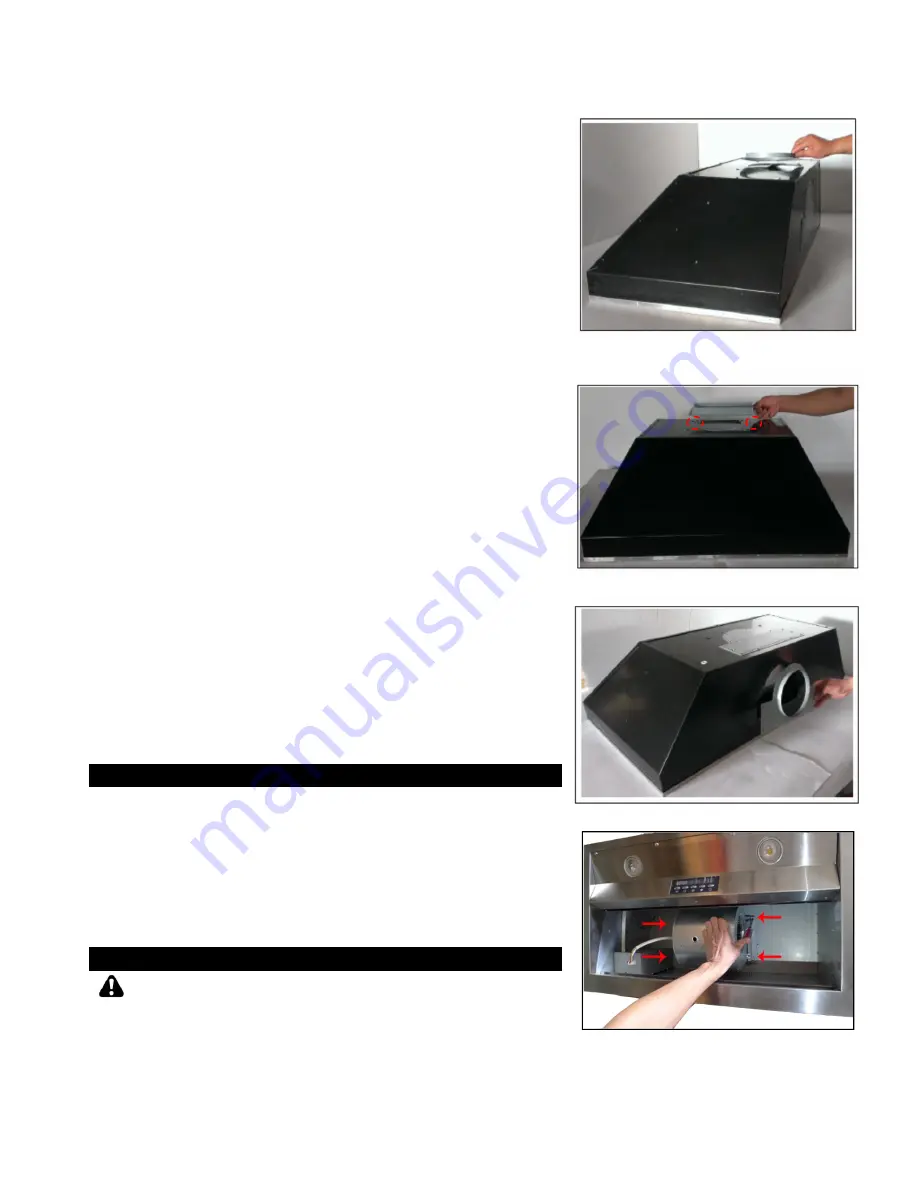
6
NOTE: The blower is pre-installed for top vent. If
installing as rear vent, follow the steps below.
9. For Rear 6” round installation only:
-
Remove the Rear Round Vent Cover and Rear
Rectangular Vent Cover (Refer to Figure 4). Keep
screws to attach Round Exhaust Plate to rear vent.
-
Remove the pre-installed Round Exhaust Plate from top
vent (Refer to Figure 5). Attach it to the rear vent (Refer
to Figure 7) using the screws removed from vent covers.
-
Use the Round and Rectangular vent covers removed
from rear vent to seal top vent.
-
Remove the 4 screws that secure the blower system
(Refer to Figure 8). Hold the blower to keep it from
dropping as you remove screws. Keep screws to re-
attach blower. Slowly rotate blower system to align with
mounting holes at the back of the hood. Secure blower
using 4 screws (Refer to Figure 9).
10. For Rear 3-1/4” x 10” rectangular installation only:
-
Remove the Rear Round Vent Cover and Rear
Rectangular Vent Cover (Refer to Figure 5). Keep
screws to attach Rectangular Exhaust Plate and
Rectangular Exhaust Adapter.
-
Place the Rectangular Exhaust Plate over vent and
secure with 2 screws (Refer to Figure 10). Place
Rectangular Exhaust Adapter over the Rectangular
Exhaust Plate and secure with 10 screws (Refer to
Figure 10).
-
Use remaining screws to secure exhaust plate.
-
Remove the pre-installed Round Exhaust Plate from top
vent and keep screws (Refer to Figure 4). Use the Round
and Rectangular vent covers removed from rear to seal
top vent.
-
Remove the 4 screws that secure the blower system
(Refer to Figure 8). Hold the blower to keep it from
dropping as you remove screws. Keep screws to re-
attach blower. Slowly rotate blower system to align with
mounting holes at the back of the hood. Secure the
blower using 4 screws (Refer to Figure 9).
Duct Work Installation
11.
Determine and make all necessary cuts in the wall or ceiling
for the ductwork. Note: Install the ductwork before installing
the hood.
12.
Use
steel pipe to connect the exhaust on the hood to the
ductwork above. Use duct tape to make all joints secure and
air tight.
13.
Please refer to local building codes for the usage of a damper
(not included).
Wiring to Power Supply
SAFETY WARNING
RISK OF ELECTRICAL SHOCK. THIS RANGE HOOD MUST BE
PROPERLY GROUNDED. MAKE SURE THIS IS DONE BY
QUALIFIED ELECTRICIAN IN ACCORDANCE WITH ALL
APPLICABLE NATIONAL AND LOCAL ELECTRICAL CODES.
BEFORE CONNECTING WIRES, SWITCH POWER OFF AT
Figure 5
Figure 6
Figure 7
Figure 8










































